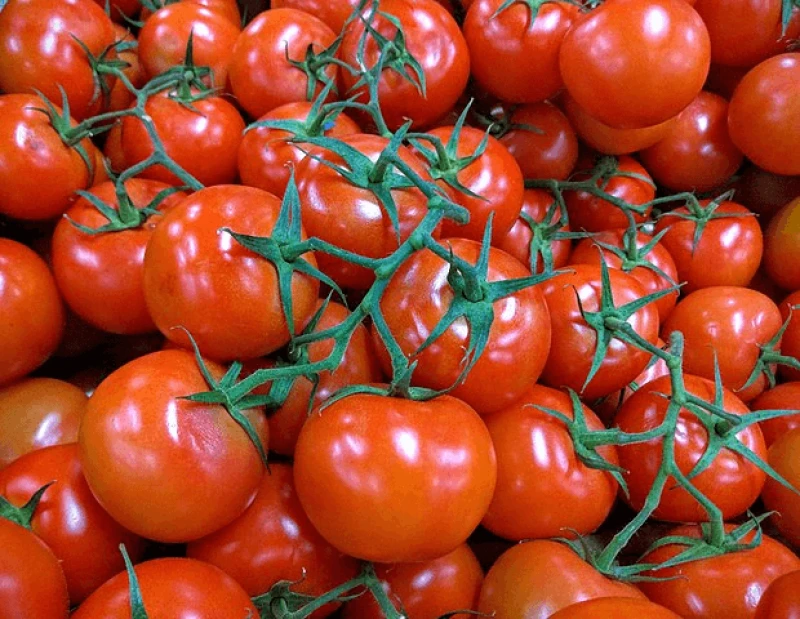Tomatoes that are delicious, not too fleshy and yet harvestable? With gene editing, they may be on the way
Tomatoes that are delicious, not too fleshy and yet harvestable? With gene editing, they may be on the way


A supermarket tomato can be a delicate thing, easily squashed. Tomatoes grown for canning are a lot tougher. Even when vine-ripened, they’re unscathed by huge harvesting machines that rip out plants row by row, shake loose the fruits, and fling them into trucks. Such durability makes these tomatoes cheap to farm, but they’re also a bit bland when eaten raw; cooks typically turn them into sauce.
Now, researchers have discovered the gene that gives canned tomatoes, typically the Roma variety, their durable shape. The finding, reported [September 18] in Nature Plants, could allow breeders to create tomato varieties that are delicious yet also strong enough to be harvested by machine.
For several years, Chuanyou Li, a plant geneticist at Shandong Agricultural University, has been working on a solution to this conundrum. In the new study, he and his colleagues decided to identify the gene that gives Roma tomatoes their rugged, egglike shape. Its approximate location was already known, but the gene itself had proved elusive.
…
Next, Li and colleagues knocked out Solyc08g061910 with the gene-editing method CRISPR in a round tomato variety known as TB0249. This trick replicated the mutation found in Roma tomatoes. When the experimental plants matured and flowered, they had elongated fruit, just like Romas.
This is an excerpt. Read the original post here

 | Videos | More... |

Video: Nuclear energy will destroy us? Global warming is an existential threat? Chemicals are massacring bees? Donate to the Green Industrial Complex!
 | Bees & Pollinators | More... |

GLP podcast: Science journalism is a mess. Here’s how to fix it

Mosquito massacre: Can we safely tackle malaria with a CRISPR gene drive?

Are we facing an ‘Insect Apocalypse’ caused by ‘intensive, industrial’ farming and agricultural chemicals? The media say yes; Science says ‘no’
 | Infographics | More... |

Infographic: Global regulatory and health research agencies on whether glyphosate causes cancer
 | GMO FAQs | More... |

Why is there controversy over GMO foods but not GMO drugs?

How are GMOs labeled around the world?

How does genetic engineering differ from conventional breeding?
 | GLP Profiles | More... |

Alex Jones: Right-wing conspiracy theorist stokes fear of GMOs, pesticides to sell ‘health supplements’




 Viewpoint — Fact checking MAHA mythmakers: How wellness influencers and RFK, Jr. undermine American science and health
Viewpoint — Fact checking MAHA mythmakers: How wellness influencers and RFK, Jr. undermine American science and health Viewpoint: Video — Big Solar is gobbling up productive agricultural land and hurting farmers yet providing little energy or sustainabilty gains
Viewpoint: Video — Big Solar is gobbling up productive agricultural land and hurting farmers yet providing little energy or sustainabilty gains Fighting deforestation with CO2: Biotechnology breakthrough creates sustainable palm oil alternative for cosmetics
Fighting deforestation with CO2: Biotechnology breakthrough creates sustainable palm oil alternative for cosmetics Trust issues: What happens when therapists use ChatGPT?
Trust issues: What happens when therapists use ChatGPT? 30-year-old tomato line shows genetic resistance to devastating virus
30-year-old tomato line shows genetic resistance to devastating virus California, Washington, Oregon forge immunization alliance to safeguard vaccine access against federal undermining
California, Washington, Oregon forge immunization alliance to safeguard vaccine access against federal undermining The free-range chicken dilemma: Better for birds, but with substantial costs
The free-range chicken dilemma: Better for birds, but with substantial costs ‘You have to treat the brain first’: Rethinking chronic pain with Sanjay Gupta
‘You have to treat the brain first’: Rethinking chronic pain with Sanjay Gupta
